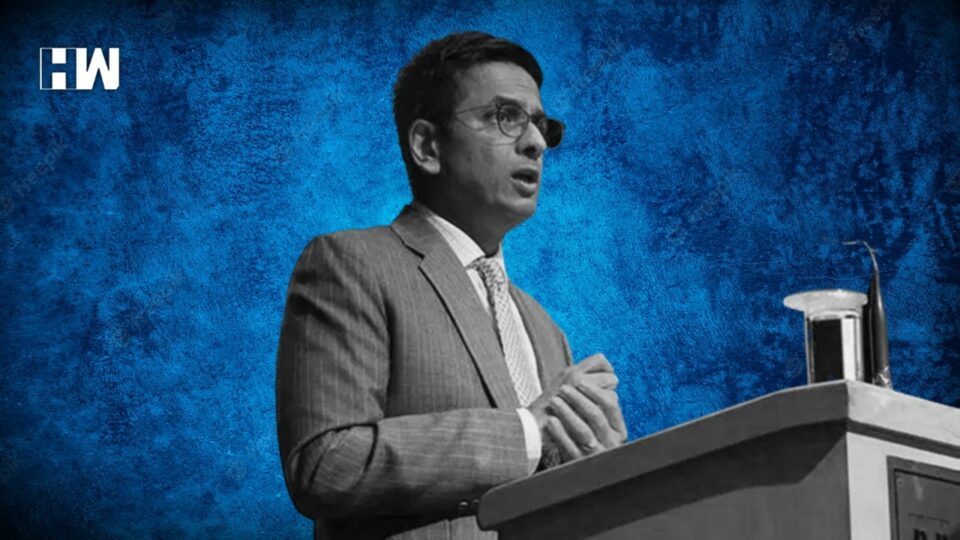Justice Chandrachud said that every citizen must exercise her or his liberty to speak against communalism, casteism, patriarchy, homophobia.
Supreme Court judge and CJI in line Justice DY Chandrachud, on Sunday, said India’s political democracy is precarious until it’s not supported by social democracy and social justice. While advocating that the country’s 75th year of independence must also be an occasion for critical introspection since women and many other communities are yet to effectively “taste the fruit of democracy”.
Justice Chandrachud was speaking at the convocation of the OP Jindal Global University where he bore down on the significance of social democracy and social justice as instruments to achieve the ideals and values enshrined in the Constitution of India, appealing to the people, to adopt the promotion of social democracy as their constitutional duty.
Acknowledging that India has taken “mighty strides”, in all spheres of life since 1947, the SC justice, warned that the 75th Independence Day should not become another ritualistic celebration of the freedom struggle. “Rather, it should become a site for a critical introspection of our progress in fulfilling the basic ideals of our Constitution, as enumerated by our Constitution-makers,” Mr. Chandrachud highlighted.
Expressing his concern Mr. Chandrachud, said that even after 75 years of India’s Independence, many individuals and communities are yet to effectively “taste the fruit of the democracy inherited by us”.
Mr. Chandrachud further said, “Because of our hierarchical social and economic structures, many of our citizens are still deprived of equality in social and economic spheres. As Babasaheb Dr. Bhimrao Ambedkar warned us, our present structures of political democracy are precarious until they are not supported by social democracy,” flagged the senior judge.
Speaking in detail about social justice and Social democracy, he said, is not a form of government, but a medium to secure social justice, “which, in turn, ensures that equal social and economic opportunities are available to all people in our society, regardless of their religion, race, caste, sex, gender, or place of birth.”
The judge explained that though laws may provide for “formal” equality of opportunity, in an asymmetrical world, opportunities are unequally distributed. “Such opportunities open many doors for the ‘haves’ but shut the door for the ‘have-nots’. Thus, in our quest for social justice, we must strive to provide equal opportunities to persons, especially from the marginalized communities, to empower them to effectively enjoy their liberties.”
As the constitutional culture inheres in all citizens, said justice Chandrachud, it is not just the responsibility of the government or the judiciary to promote social democracy and social justice, but for everyone to participate in the “slow, but vital everyday task of transforming our constitution from a charter of ideals to a reflection of reality”.
“We hold the responsibility and the duty which accompanies it, as the inheritors and the guardians of our Constitution, to imbibe and inculcate the constitutional ideals into our daily lives to promote social democracy. It ought to be regarded as a constitutional duty, and it surely is a moral obligation,” he said.
Justice Chandrachud urged, that the country must also introspect in its 75th year of independence if women have been provided adequate opportunities to effectively exercise their freedoms and participate in public life, regretting that the laws which have been enacted to enhance the capabilities and freedoms of women are “inadequate and limiting”.
The judge mentioned a recent case before a Supreme Court bench. That was headed by him. A woman was denied the right to terminate her pregnancy at 24 weeks since the relevant law did not allow an unmarried woman to do so.
Justice Chandrachud further said, “We considered the legislative intent of Parliament and purposively interpreted the provisions of the Act to uphold the right of the unmarried woman to seek safe termination of pregnancy. In this case, the petitioner had access to effective legal representation to scale the legal barriers. But think about many such women across India, who find themselves in similar situations, without access to any legal aid.”
“Although women may have access to various material choices, the exercise of such choices is dependent upon material pre-conditions, crafted in laws and regulations. “It is our moral and constitutional responsibility to understand these obstacles and address them to effectively empower women to enjoy their freedoms and participate in public life,” Mr, Chandrachud emphasized.
Appealing to the citizens of the country, the justice asked to speak against harmful attitudes against marginalized communities. Justice Chandrachud said that every citizen must exercise her or his liberty to speak against communalism, casteism, patriarchy, homophobia, and such other harmful attitudes against marginalized communities.
Advising the young law graduates, the senior judge said, to break free from the “shackles of algorithms” and reach out to those on the other side of the spectrum and understand their perspectives.
“Together if we can follow these ideals, I am sure that the day is not far away when India will truly become a social democracy,” he concluded.
As an independent media platform, we do not take advertisements from governments and corporate houses. It is you, our readers, who have supported us on our journey to do honest and unbiased journalism. Please contribute, so that we can continue to do the same in future.

